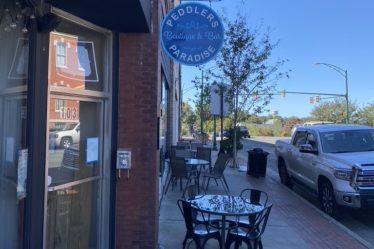
We just launched our brand new https://shop.bzfurfur.com and we’ve learned a lot in the process. We are launching this five-part weekly series, every Tuesday starting March 21, as a way to help other makers on a similar journey.
Last week we started our series talking about domain names. With your domain secured it is time to start thinking about where to host your site. This is where the options really start piling up. As you start shopping around you’ll hear things like software-as-a-service, cloud hosting, e-commerce platform, and dedicated hosts. I could fill up the remainder of this post with the various buzzwords around web design. You need to cut through the noise. So, what are your options?
Turn-key Services
All-in-one concierge-type services like Etsy and Shopify will get your store up and running quickly. These types of turn-key services are great as they don’t require you to build a site, worry about taxes and shipping, research how to market your site, and optimize your page for speed. Instead, you just set a few parameters and start listing your products.
With this ease of use, they come with some disadvantages: they aren’t very flexible only offering you a narrow range of designs and features. When they do offer customization they are often al la carte and the costs quickly add up. Additionally, the monolithic design of these sites means it is very hard to set yourself apart from your competitors. Lastly, they often change their marketing and rankings so your products can go from being the first in a list of search results to the last overnight.
“Cookie Cutter” Websites
There are a number of these types of services that allow you to build your own website and, for the most part, they deliver. The two most well-known are Wix and SquareSpace but there are others in this space as well. These are not bad options for someone starting out. They are often fairly cost-effective, have a bunch of templates to pick from, and allow you to sell your products, create blogs, link to social media, add picture galleries, etc to flesh out your website and build a brand.
The major disadvantages are that you need to drive your own traffic to your site, some of the templates can be pretty restrictive in how they can be configured, and it may be difficult to port your site to another service if you are unhappy with the company or decide it is time to grow.
Publishing Platforms
There are a number of Content Management Systems (CMS) on the market if you want to build and host your website on your own. WordPress, the most well-established of these has been around for ages and is now responsible for something in the range of half the websites on the internet. For the uninitiated WordPress can be daunting. So, if you are going to go this route make sure you are setting aside time to watch YouTube videos or get someone with some experience to give you the rundown.
Once you get a handle on it, however, it can be very powerful allowing for thousands of plugins, and themes. Plus, if you are planning to sell, WooCommerce, WordPress’ sales platform, is pretty mature at this point. If you go this route look at companies like GoDaddy and HostGator which often offer reasonable prices with deep discounts if you are willing to sign up for multiple years. Most offer WordPress one-click installation at no cost. If you are just starting out consider their lowest tier option as it is usually sufficient and should perform reasonably well.
Hire a freelance web designer
This is going to be the most costly option and should only really be considered if you have a decent size budget for your site and you want something highly customized. A freelance agent or agency will be able to make something that is very unique and customized but could run you anywhere from a few hundred bucks to well into the thousands. Stay away from any freelance developer that offers you an e-commerce website for anything less than $500 because it will, more than likely, be a painful experience that will have you contacting one of the more costly agents not soon afterward to start over from scratch. Also, be careful of scams. There are hundreds of companies cold-calling new, small businesses to offer web design solutions. Research local agencies or agencies with good reputations.
| Price | Ease of Use | Customization | |
| Concierge | $$$ | novice | low |
| Cookie-cutter | $$ | intermediate | medium |
| Publishing Platforms | $ | expert | high |
| Freelance | $$$$ | novice | high |
Which is right for me?
If you are using a concierge website or a freelance web designer you should have a very low-touch experience. It will mainly be about getting high-quality pictures of your work, adding products to your catalog, writing blog posts, and promoting your website. For cookie-cutter websites and publishing platforms, you may be investing a lot more time into choosing templates, setting colors, and generally styling your site.
If you have the budget I highly recommend getting a web designer. They understand the market very well and will recommend the things that get people to your website, and keep them there. They will also make sure that your brand is properly represented on your site, something that can be easily lost via some of the other options.
If your budget doesn’t allow for a web designer then it comes down to how tech-savvy you are. If you like getting into the nuts and bolts of how things work then using a publishing platform like WordPress can be extremely effective as you can tweak the site to your heart’s content by choosing different themes, enabling plugins, creating layouts for your posts, and so on. You’ll save yourself a few bucks too but expect that you’ll be spending a lot of time working on the site that could be going into making product
For most people going with one of the cookie-cutter or concierge platforms will suffice, at least in the early stages. They will provide you with a way to offer your products to people without having to learn all the details of how to build an e-commerce website. Eventually, you will probably want to move to something tailored to your company.
What’s next?
Come back next Tuesday and we’ll be talking about search engine optimization. Your website isn’t much if you can’t get it in from of people. Learn how to ensure your website is well-suited for all the major search engines.




Terrific work! This is the type of information that should be shared around the web. Shame on Google for not positioning this post higher! Come on over and visit my web site . Thanks =)
Hi! Would you mind if I share your blog with my myspace group? There’s a lot of people that I think would really appreciate your content. Please let me know. Many thanks